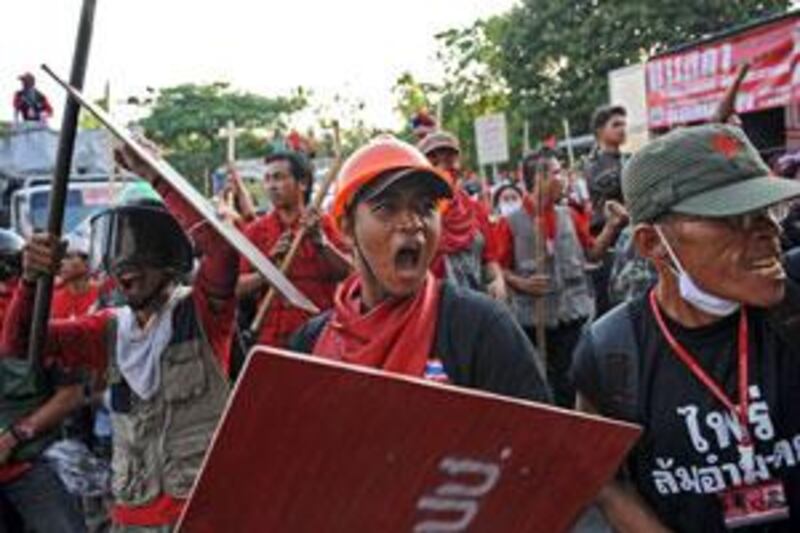BANGKOK // The Thai capital's main financial district was partially crippled today following deadly grenade attacks and a tense standoff between diehard, anti-government demonstrators and a government that has yielded vital areas of Bangkok to them. Many banks, offices, restaurants and a major shopping complex were closed along Silom Road, known as Thailand's Wall Street. Traffic was light in the normally jammed four-lane thoroughfare, and even many small-time food vendors had left their patches of pavement.
The late-night attacks involved five M-79 grenades shot from near where anti-government Red Shirt protesters have been encamped for weeks. The blasts struck areas where counter-demonstrators gathered, but the government stopped short of directly blaming the Red Shirts. The attacks killed at least one person and wounded 86, according to the government's Erawan Emergency Center, which handles victim counts in crises and disasters. The latest violence occurred in Bangkok's financial district where soldiers have been stationed. Across the intersection, Red Shirts have built barricades of tires and bamboo stakes. Behind the barricades, Red Shirts have created a virtual village complete with sleeping tents, canteens and portable toilets. Five-star hotels, shopping malls and office buildings in the upscale district have closed. Silom Road is lined with bank headquarters and other office buildings, but also is a popular tourist destination, filled with restaurants and popular nightlife venues. But late last night, it looked more like a war zone with grenade blasts lighting the night sky and panicked people fleeing the scene. Some rushed the wounded to safety as throngs of riot police and armed soldiers swarmed the area. A protest leader, Nattawut Saikua, said he spent the night in talks with the deputy prime minister, Korbsak Sabhavasu, but that there appeared to be no resolution to the crisis.
The head of a key security agency, Tharit Pengdit, urged the general public to avoid the area near the protests and warned that anyone involved in "terrorism" will face the death penalty. Thousands of mostly rural Red Shirts have been entrenched on Bangkok's streets since March 12 in a campaign to dissolve parliament and hold immediate elections. Thailand's powerful military has warned them that time is running out to clear the streets or face a clampdown.
In New York, the UN secretary general Ban Ki-moon voiced concern that the situation could escalate and called for dialogue, his spokesman said. And the US State Department advised American citizens to avoid travel to Bangkok. Earlier in the week, the US had recommended against visiting the Thai capital but did not go as far to advise against it. "Due to escalating violence in central Bangkok, all US citizens should avoid non-essential travel to Bangkok," the advisory said. "The possibility of more such attacks cannot be ruled out."
The latest violence occurred in Bangkok's financial district where soldiers have been stationed. Across the intersection, Red Shirts have built barricades of tires and bamboo stakes. Behind the barricades, Red Shirts have created a virtual village complete with sleeping tents, canteens and portable toilets. Five-star hotels, shopping malls and office buildings in the upscale district have closed. Silom Road is lined with bank headquarters and other office buildings, but also is a popular tourist destination, filled with restaurants and popular nightlife venues.
But late last night, it looked more like a war zone with grenade blasts lighting the night sky and panicked people fleeing the scene. Some rushed the wounded to safety as throngs of riot police and armed soldiers swarmed the area. A protest leader, Nattawut Saikua, said he spent the night in talks with the deputy prime minister, Korbsak Sabhavasu, but that there appeared to be no resolution to the crisis.
The Red Shirts consist mainly of poor rural supporters of former prime minister Thaksin Shinawatra and pro-democracy activists who opposed the military coup that ousted him in 2006 after months of demonstrations by the Yellow Shirts. The Red Shirts believe the government of prime minister Abhisit Vejjajiva is illegitimate because it came to power under military pressure through a parliamentary vote after disputed court rulings ousted two elected pro-Thaksin governments. They want parliament dissolved and new elections held.
The first three blasts last night struck an elevated train station on Silom. Soldiers rushed passengers away from the blasts down the station's stairs. Two further blasts struck an intersection filled with demonstrators protesting against the Red Shirts as well as bystanders. Chaos ensued, as scores of wounded were tended to and carried to ambulances. The front window of the sandwich shop was shattered, and a pool of blood was on its stoop.
Bangkok's elevated train and subway transit systems shut nearby stations today. A government spokesman, Panitan Wattanayagorn, said the blasts were under investigation but that it was too soon to come to any conclusions. "This is the work of the terrorists that the government has always been wanting to get rid off," he said. Since the beginning of the crisis, Mr Abhisit's government has threatened to curtail the protests but has failed to follow through. Military units from the 200,000-strong army have been routed in several encounters with the crudely armed demonstrators. And the police have often melted when faced with determined rioters.
In a previous burst of violence, 25 people were killed and more than 800 wounded on April 10 when the army sought to clear out Red Shirt protesters from an encampment in another part of the capital. * AP





